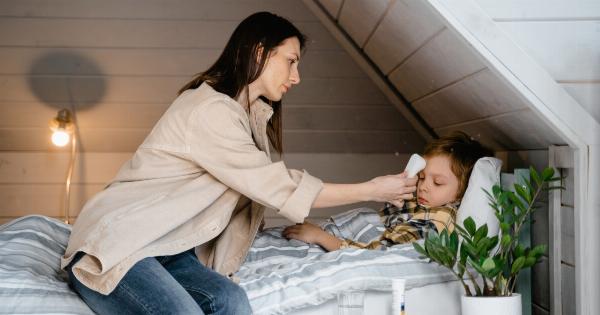As a parent, it can be alarming to see your child’s temperature rise with a fever. Fevers are a common symptom of many childhood illnesses, but they can also be a sign of a more serious condition.
Here are some tips to help you care for your child’s fever and determine when it’s time to call the doctor.
Measure Your Child’s Temperature
The first step in caring for your child’s fever is to measure their temperature. There are several ways to do this:.
- Oral thermometer: Place the tip of the thermometer under your child’s tongue for a few moments to get a reading.
- Axillary thermometer: Place the thermometer under your child’s arm and hold it in place for a few minutes to get a reading.
- Ear thermometer: Gently insert the thermometer into your child’s ear canal to get a reading.
- Forehead thermometer: Place the thermometer on your child’s forehead and swipe it across to get a reading.
Consult your pediatrician on which type of thermometer they recommend for children of your child’s age and be sure to follow the instructions on the thermometer for accurate readings.
Look for Symptoms
Along with a fever, your child may exhibit other symptoms that can help you determine the cause of their illness:.
- Coughing
- Sneezing
- Runny nose
- Sore throat
- Headache
- Vomiting and/or diarrhea
These symptoms can help your pediatrician diagnose the cause of your child’s illness and determine the best course of treatment.
Monitor Your Child’s Fluids
Fever can cause dehydration, which can make your child feel worse. Encourage your child to drink fluids, such as water, clear broths, or an electrolyte solution like Pedialyte, to stay hydrated. Avoid sugary drinks or drinks with caffeine.
Offer your child small sips throughout the day to keep them hydrated.
Keep Your Child Comfortable
Your child may feel uncomfortable with a fever. Here are some things you can do to keep them comfortable:.
- Dress them in lightweight clothing
- Use a cool, damp washcloth to wipe their forehead, back, and chest
- Offer acetaminophen (Tylenol) or ibuprofen (Motrin) if your pediatrician approves and follow their recommended dosage
- Let them rest and sleep as much as possible
Pay Attention to the Fever’s Duration
If your child’s fever lasts more than 24 hours or if they have a high fever (over 103°F), it may be time to call your pediatrician. If your child is under three months old and has a fever, you should call your pediatrician immediately.
They may want to see your child for an examination and to make sure there isn’t an underlying infection.
Keep Your Child Home
If your child has a fever, it’s important to keep them home from school or daycare until they are fever-free for at least 24 hours. This helps prevent the spread of the illness to others.
Know When to Seek Medical Help
If your child has a fever and exhibits any of the following symptoms, it’s important to call your pediatrician right away:.
- Difficulty breathing or rapid breathing
- Bluish skin color
- Stiff neck or headache with a fever
- Severe vomiting or diarrhea
- Seizures
- Extreme lethargy or difficulty waking up
These symptoms could indicate a more serious condition and require immediate medical attention. Trust your instincts as a parent and seek medical help if you are ever unsure.































